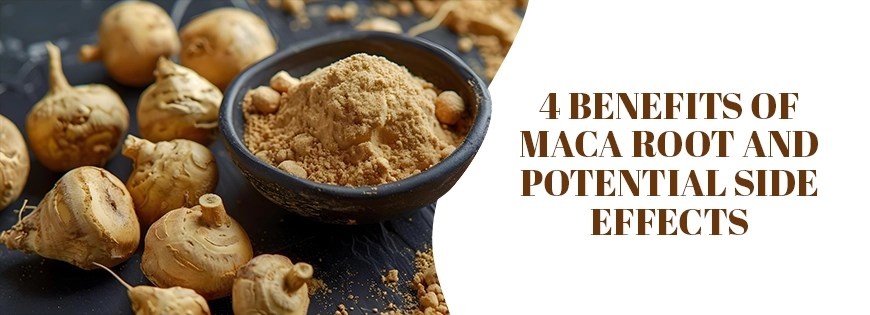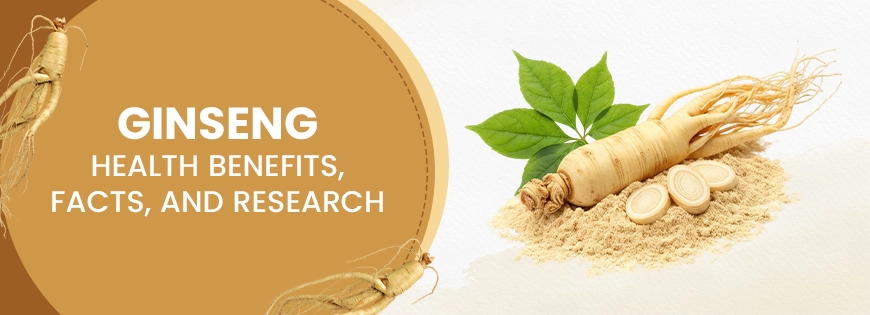Maca root (Lepidium meyenii), sometimes called “Peruvian ginseng,” is a plant that grows high in the Andes mountains of Peru. For centuries, it’s been valued as both a food and a natural remedy. Traditionally, maca was eaten roasted, made into porridge, or brewed into drinks to support stamina, fertility, and general vitality.
In recent years, maca has gained popularity worldwide as a powdered supplement that can be mixed into smoothies, coffee, or baked goods. People are drawn to it for its potential health benefits, from energy support to hormone balance.
May Support Sexual Health

One of the best-known traditional uses of maca root is for sexual well-being.
Men’s Sexual Health:
Research on maca root in healthy men shows mixed results. While some studies found improvements in sexual desire after 8–12 weeks without changes in hormone levels, effects on sperm quality were inconsistent. In men with mild erectile dysfunction, maca improved sexual wellbeing, while in certain infertility cases, results were modest or absent. In older men with symptoms of andropause, maca reduced symptoms and improved erectile function without altering testosterone or other key health markers.
Women’s Sexual Health:
In healthy women, maca was generally well tolerated, with minor physiological changes depending on the dose. In menopausal women, multiple trials found that maca (gelatinized or powdered) reduced the severity of menopausal symptoms such as hot flashes, mood changes, sleep disturbances, and sexual dysfunction, though hormone level changes were inconsistent. Improvements in quality of life, mental health, and social functioning were also noted. Evidence for maca’s effect on fertility in reproductive-age women is limited and inconclusive.
A 2008 study published in CNS Neuroscience & Therapeutics tested maca root in people with sexual side effects from antidepressants (SSRIs). Over 12 weeks, those taking a higher dose (3 g/day) had greater improvements in sexual function and libido than those on a lower dose (1.5 g/day). Maca was well tolerated, suggesting it could be a natural option for managing antidepressant-related sexual problems.
May Boost Energy and Mood

Maca is often described as an energy booster without the jittery effects of caffeine. Some people report feeling more alert and motivated after adding maca to their diet.
Scientists believe this effect may be linked to maca’s role as an adaptogen, a plant thought to help the body cope with stress and restore balance. A 2023 Food & Nutrition Research placebo-controlled crossover study tested 2,500 mg/day of Black Maca extract for 4 weeks in eight elite female handball players. Compared to placebo, Black Maca significantly improved trunk and knee isokinetic muscle function, 20 m shuttle run performance, and endurance, suggesting benefits for reducing fatigue and enhancing high-intensity athletic performance.
May Help with Menopausal Symptoms

During menopause, many women experience symptoms such as hot flashes, night sweats, mood changes, and trouble sleeping. Some small studies suggest that maca may help ease these symptoms, possibly by supporting hormone balance.
A 2011 Maturitas systematic review assessed four randomized controlled trials on maca (Lepidium meyenii) for menopausal symptoms in peri- to postmenopausal women. All trials reported improvements over placebo using the Kupperman Menopausal Index (a scoring system evaluating symptom severity such as hot flashes, sweating, insomnia, mood changes, and joint pain) and the Greene Climacteric Score. While findings suggest maca may help relieve menopausal symptoms, the small number of studies, limited sample sizes, and unproven safety mean further large-scale, high-quality trials are needed.
Potential for Improved Fertility

Traditional Andean cultures have consumed maca for its role in enhancing fertility, and modern research points to several mechanisms by which the root may support reproductive success. In men, maca supplementation has been correlated with improved semen quality, sperm shape, and motility. For women, maca’s ability to modulate hormonal balance may help create an optimal internal environment for conception, although most evidence is anecdotal or from small-scale studies.
A 2018 Journal of Ethnopharmacology review found that while maca has a long history in the Andes for boosting fertility and vitality, modern claims for reproductive health lack strong scientific proof. Evidence from trials is inconclusive, and mass cultivation outside Peru may affect quality, safety, and sustainability.
Maca also contains antioxidants, which can help protect your body from damage caused by free radicals, unstable molecules that contribute to aging and certain chronic diseases.
Depending on the variety, maca root can be yellow, red, or black, with each type having slightly different nutrient profiles and potential benefits.
Summary: Maca is more than just a supplement — it’s a functional food with a mix of carbohydrates, proteins, minerals, and protective plant compounds.
Potential Side Effects of Maca Root

For most healthy adults, maca appears to be safe when consumed in moderate amounts, such as up to 1.5–3 grams of powdered root per day. However, there are a few things to keep in mind:
- Digestive Upset: Some people may experience bloating, gas, or stomach discomfort, especially when starting maca or taking large doses.
- Hormone-Sensitive Conditions: Because maca may affect hormone balance, people with conditions such as breast, ovarian, or prostate cancer should speak to a doctor before using it.
- Quality and Contamination Risks: As with all supplements, it’s important to choose a reputable brand. There have been rare cases of heavy metal contamination (such as lead) in poorly sourced maca products. We at Naturmed Scientific assure the finest quality.
- Pregnancy and Breastfeeding: There isn’t enough reliable information to confirm maca’s safety during pregnancy or breastfeeding, so it’s generally recommended to avoid it in these situations.
How to Use Maca
Maca powder has a mild, nutty, slightly caramel-like flavor. Common ways to add it to your diet include:
- Stirring into smoothies or shakes
- Mixing into oatmeal or yogurt
- Adding to baked goods like muffins or pancakes
- Blending into hot drinks like lattes or hot chocolate
If you’re new to maca, start with ½ teaspoon per day, then gradually increase to 1–2 teaspoons. This gives your body time to adjust and reduces the risk of digestive discomfort.
Maca root is a fascinating plant with a long history of use in traditional Andean medicine. Modern research suggests it may support sexual health, boost energy, help ease menopausal symptoms, and provide valuable nutrients and antioxidants.
That said, most studies are small, and more research is needed to fully understand maca’s effects. As with any supplement, it’s best to use maca as part of a balanced diet, and check with a healthcare professional before starting, especially if you have a medical condition or take prescription medications.
When sourced responsibly and taken in moderation, maca root can be a versatile, nutrient-rich addition to your wellness routine.
Disclaimer: The Statement has not been evaluated by the EFSA, KFDA or FDA. This product is not intended to diagnose, treat, cure, or prevent any disease. While the information provided is based on credible references, we do not make any specific claims or guarantees. It is important to consult with your healthcare advisor for personalized advice and guidance related to your health.
References:
- A Double‐Blind, Randomized, Pilot Dose‐Finding Study of Maca Root (L. Meyenii) for the Management of SSRI‐Induced Sexual Dysfunction
- Exploring the chemical and pharmacological variability of Lepidium meyenii: a comprehensive review of the effects of maca
- Effects of Black Maca supplement on isokinetics muscular performance of elite women’s handball players: placebo-controlled, crossover study
- Is the hype around the reproductive health claims of maca (Lepidium meyenii Walp.) justified?






